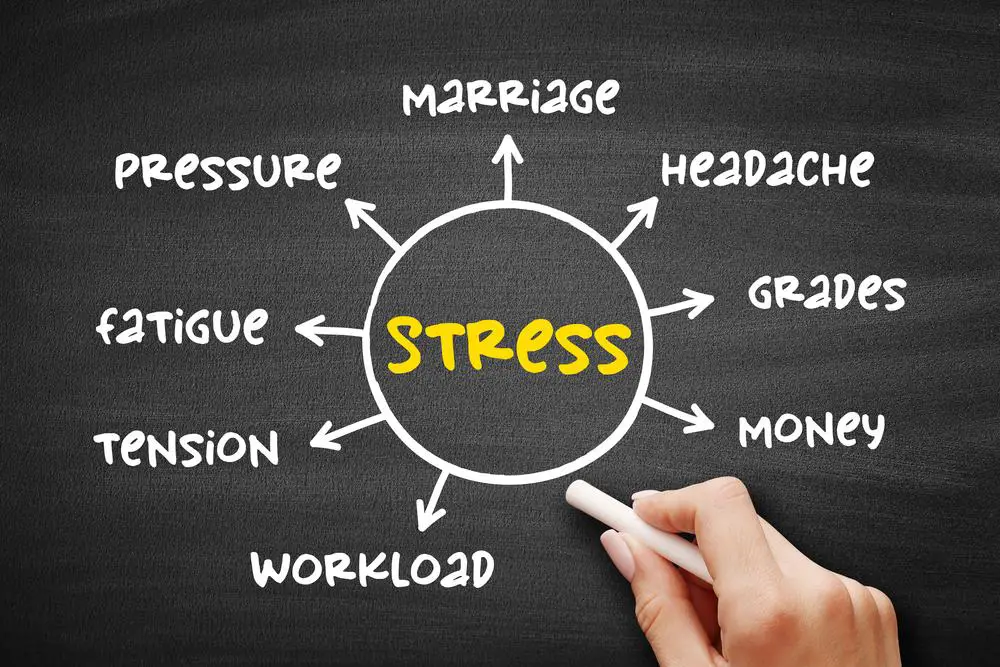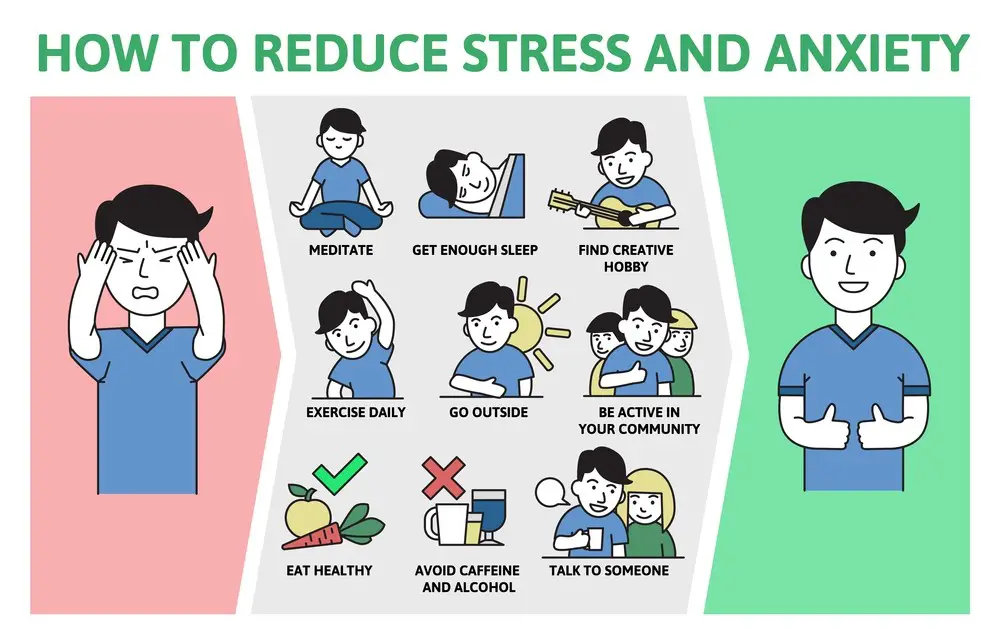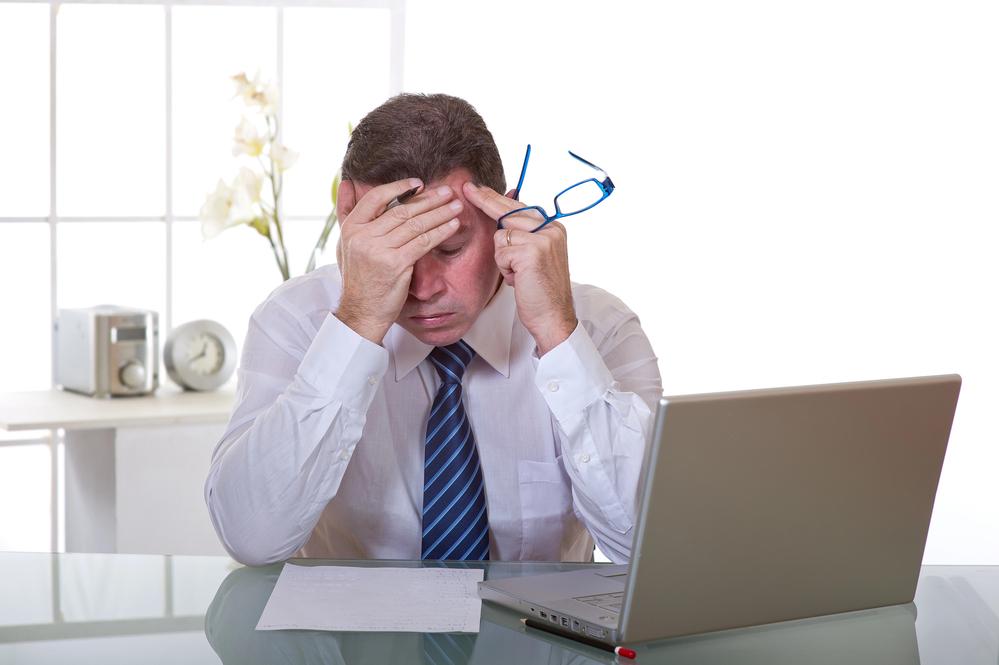Many often wonder if their constant tiredness can stem from stress. The fact is, stress can indeed lead to fatigue, affecting both your mood and ability to focus. This article will explore how managing stress effectively can boost energy levels and improve overall well-being.
Stay tuned to uncover solutions that might change how you feel daily.
The Impact of Stress on Fatigue
 Stress wreaks havoc on both the body and mind, often leaving you feeling drained and unable to concentrate. This overwhelming sense of tiredness can stem from various sources, including workplace stress or chronic anxiety.
Stress wreaks havoc on both the body and mind, often leaving you feeling drained and unable to concentrate. This overwhelming sense of tiredness can stem from various sources, including workplace stress or chronic anxiety.
It directly contributes to irritability and a marked decrease in your ability to focus on daily tasks. Chronic stress doesn’t just linger; it profoundly affects every aspect of your being, leading to significant fatigue that feels constant and sometimes even disabling.
Physical symptoms like dizziness accompany this mental weariness, while emotional symptoms such as anxiety intensify the exhaustion experienced. The connection between prolonged stress and severe health impacts underscores the importance of addressing these issues promptly.
As we delve deeper into understanding this link, it becomes clear that mitigating stress is crucial for improving overall well-being and energy levels. Moving forward, exploring the specific ways in which stress intertwines with exhaustion will shed further light on how these factors influence each other.
Understanding the Link between Stress and Exhaustion
Chronic stress triggers your body’s fight-or-flight response, increasing heart rate and blood pressure. This constant alertness drains your energy reserves, causing fatigue over time.
Chronic Stress
Chronic stress wears on your body and mind, leading to a state of constant exhaustion that can become debilitating. It affects every part of you, disrupting sleep and making concentrating hard.
Your mood may suffer, too, leaving you feeling irritable or anxious. Over time, this unrelenting pressure weakens your immune system and impacts your overall well-being.
Dealing with chronic stress means facing symptoms like mental fatigue, which plays a central role in stress-related exhaustion disorder. Cognitive functions decline under prolonged stress, causing decision-making and memory recall difficulties.
The physical toll is equally significant; you might notice dizziness or decreased libido due to affected hormone production. Recognizing these signs early helps in managing the adverse effects more effectively.
Pressure Points
 Identifying and understanding pressure points in your life can significantly impact managing stress and preventing fatigue. These pressure points often stem from workplace stress, chronic anxiety, or overwhelming personal responsibilities.
Identifying and understanding pressure points in your life can significantly impact managing stress and preventing fatigue. These pressure points often stem from workplace stress, chronic anxiety, or overwhelming personal responsibilities.
They act as triggers, elevating stress levels, which in turn can lead to mental fatigue and physical exhaustion. Recognizing these areas provides a critical first step toward developing strategies for relief and recovery.
Tackling these pressure points involves effective stress management techniques such as relaxation, setting realistic goals, and maintaining healthy boundaries between work and personal life.
This proactive approach helps reduce the immediate effects of stress and prevents the development of long-term issues like burnout or adrenal fatigue. Exploring the connection between stress and fatigue will further unravel how intertwined they are and why managing one effectively benefits the other.
Unraveling the Connection: Stress and Fatigue Explained
 Stress triggers your body’s fight or flight response, releasing hormones that increase heart rate and energy levels. However, prolonged exposure to stressful situations can lead to chronic stress, weakening the body’s resources and causing fatigue.
Stress triggers your body’s fight or flight response, releasing hormones that increase heart rate and energy levels. However, prolonged exposure to stressful situations can lead to chronic stress, weakening the body’s resources and causing fatigue.
This constant state of alertness demands a lot of energy, leaving you feeling drained and unable to focus or perform daily tasks effectively. Mental fatigue becomes a significant symptom here, making it hard to concentrate and leading to irritability.
Chronic stress impacts nearly every part of your body and mind, contributing to a wide range of symptoms from dizziness to anxiety. Over time, this relentless pressure also takes a toll on your physical health, affecting systems like immune function and further exacerbating feelings of tiredness.
The cycle of stress and fatigue feeds into itself; the more tired you become, the less capable you are of managing stress effectively.
Tiredness Unveiled: How Stress Affects Energy Levels
Having explored how stress and fatigue intertwine, it becomes crucial to delve deeper into how stress impacts energy levels. Chronic stress wears on your body and mind, often resulting in a relentless feeling of drained.
This is not simply about feeling tired after a long day; it’s about experiencing a profound exhaustion that doesn’t go away with rest or sleep. The effects span across causing cognitive decline to sparking feelings of irritability, making daily tasks seem impossible.
This constant state of exhaustion can profoundly affect one’s quality of life, leading to mental health issues such as anxiety and depression. The cycle where chronic stress leads to mental fatigue, contributing to physical symptoms, is significant in understanding the overall impact on energy levels.
Combatting Fatigue: Managing Stress for More Energy
Combating fatigue and low energy levels often starts with identifying and reducing major sources of stress. When we’re overly stressed, our bodies produce stress hormones like cortisol that, over time, sap our energy.
Relaxing techniques like deep breathing, meditation, yoga, or regular breaks can lower stress hormones. Getting on a regular sleep schedule with 7-9 hours per night, eating a balanced, nutritious diet, exercising, and setting aside time for enjoyable hobbies can also keep stress from accumulating and our energy stores replenished.
Additionally, maintaining work-life balance through proper time management is key. Being overworked and committing to too many obligations tires us out. Set reasonable goals for tasks and chunk projects into manageable parts. Also, feel free to delegate responsibilities or say no if your plate is full. Preserving time for fun, relationships, and self-care ensures we recharge.
Finally, remember relying on caffeine and sugar crashes for bursts of energy leads to fatigue later. Combat low energy by getting at its root – high, prolonged stress levels. Reduce stress across life domains and increase lifestyle factors that re-energize body and mind. The result will be less fatigue and more vibrancy.
Stress-Induced Exhaustion: Tips for Finding Relief
 When stress becomes excessive and unrelenting, it can lead to physical and mental exhaustion, taking a major toll on health and well-being.
When stress becomes excessive and unrelenting, it can lead to physical and mental exhaustion, taking a major toll on health and well-being.
To find relief, start by identifying your primary stress triggers and taking steps to reduce exposure to them. For example, heavy workloads may require delegating tasks or communicating needs with managers. Relaxing techniques like meditation, yoga, deep breathing, or regular massages can relieve stress hormones and relax the body.
Adopting long-term lifestyle habits that mitigate stress’s draining effects is just as important. Get at least 7-9 hours of quality sleep per night, eat a nutritious diet high in stress-fighting nutrients like antioxidants, moderate exercise regularly, and take regular breaks during workdays. Finding work-life balance through proper time management also prevents stress from accumulating relentlessly. Preserve time for fun, relationships, and self-care.
While these efforts take commitment and can’t eliminate stress, reducing excessive tension often restores energy.
For lasting change, be patient with yourself and realize finding relief from exhaustion requires reducing stress-inducing patterns and adopting healthier, more sustainable habits.
Stress and Tiredness: Breaking the Cycle
When we’re extremely stressed, our bodies produce hormones like cortisol for the “fight or flight” response. While this can be useful in dangerous situations, prolonged release tires out body systems. Consequently, stress and fatigue often cycle together in a downward spiral that drains our energy.
To break this cycle, daily stress-reduction practices are essential. Activities like meditation, yoga, deep breathing, and mindfulness create relaxation. Regular massages or enough sleep every night also allow the body to release stress, heal, and re-energize.
Also key is adopting healthy lifestyle habits that mitigate stress’ effects in the long term instead of providing quick bursts of energy.
Eat more whole, nutritious foods high in antioxidants while limiting processed items. Move your body through regular moderate exercise. Reduce unnecessary obligations and pace bigger tasks in manageable chunks. Say no to nonessentials and build downtime into each day for genuine renewal.
While we often turn to caffeine for artificial energy, it increases cortisol. Consistently minimize stress through relaxation practices, proper nutrition, reasonable activity goals, and rest for sustainable energy. Soon, you’ll break the stress-fatigue cycle and feel more vibrant overall.
Boosting Energy Levels: Overcoming the Fatigue-Stress Cycle
Breaking the fatigue-stress cycle starts with acknowledging how chronic stress drains your energy. It impacts every part of your body and mind, often leading to debilitating fatigue.
This type of stress comes from various sources, including workplace demands or ongoing worries about finances or relationships. Recognizing these stressors is the first step toward managing them effectively.
You can increase your energy levels by adopting healthy habits that combat stress. Regular exercise improves physical health and boosts mental well-being by releasing endorphins, known as feel-good hormones.
Stress undeniably leads to feelings of overwhelming tiredness and exhaustion. Through exploring the intricate relationship between stress and fatigue, it becomes clear that managing stress is vital for maintaining energy levels and overall health.
Techniques for reducing stress not only combat fatigue but also enhance well-being. Addressing these connections presents a pathway toward a more balanced life, free from the debilitating cycle of stress-induced tiredness.
Navigating the Path to Professional Help: Medication, Counseling, and Setting Goals
 At times, the weight of stress and the shadow of fatigue become too heavy to lift on our own. Recognizing when to step forward and seek professional help is a sign of strength, not weakness. This journey might lead you down various paths, from medication to counseling, each with its role guiding you back to wellness.
At times, the weight of stress and the shadow of fatigue become too heavy to lift on our own. Recognizing when to step forward and seek professional help is a sign of strength, not weakness. This journey might lead you down various paths, from medication to counseling, each with its role guiding you back to wellness.
- Recognizing the Signs: Persistent exhaustion that doesn’t ebb with rest, an overwhelming sense of anxiety, or a significant impact on your daily function are clear signals it’s time to reach out for help. When stress distorts your quality of life, professional guidance can support you to navigate back to calm waters.
- Medication vs. Counseling: Medication may be suggested when there’s a biological component to your stress and fatigue, offering relief from the symptoms that weigh you down. It’s often a temporary aid designed to restore balance and give you the energy to engage in other forms of healing. Conversely, counseling offers a space to explore the roots of your stress, equip you with coping strategies, and transform the way you respond to life’s pressures. Cognitive-behavioral therapy (CBT) and other therapeutic approaches can be particularly effective in altering thought patterns and reducing stress-related exhaustion.
- Setting Goals: Embarking to manage stress and combat fatigue often begins with setting clear, achievable goals. These might include small lifestyle changes, new coping strategies, or setting boundaries to protect your energy. Goals give you direction and a way to measure progress, making the journey more manageable and less overwhelming.
- Recognizing Progress: Celebrating the victories along the way is essential, no matter how small they may seem. Recognizing improvements in your energy levels, decreasing your stress levels, or simply having a better day than the last are all milestones worth acknowledging. These moments of progress are beacons of hope, reminding you that your path is leading somewhere brighter.
- When to Seek Help: Initiating the conversation about your stress and fatigue can begin with your primary care physician, who can assess your symptoms and possibly refer you to a mental health professional. There are also many community resources and online platforms that offer support and guidance for those seeking help.
- Can Stress Make You Tired? Exploring The Fatigue-Stress Connection - February 26, 2024
- Selecting the Right Workouts for Your Mental and Physical Well-being - February 26, 2024
- Is Shoulder Pain Causing You Stress? Here’s How to Help Yourself - February 26, 2024
This site contains affiliate links to products. We will receive a commission for purchases made through these links.




